Specter
Active member
Some of these are I've mentioned in other posts but I just wanted to expand it more and put everything here to make this information all in one place so that everyone can know all the items that'll be tremendously helpful during this time. You don't need to get everything on this list, just premeditate on what you're going to be doing if a pandemic breaks out and then gear up accordingly but take what's necessary. There is also unstable pricing because of supply and demands, as well as merchers. So you can only afford one item or the other, better items sometimes end up being cheaper than others so take advantage of that. Ex. 10 packs of N95 costs $100 but I got 10 packs of P95 for just $50 and P95 is better than N95
Face
Masks:
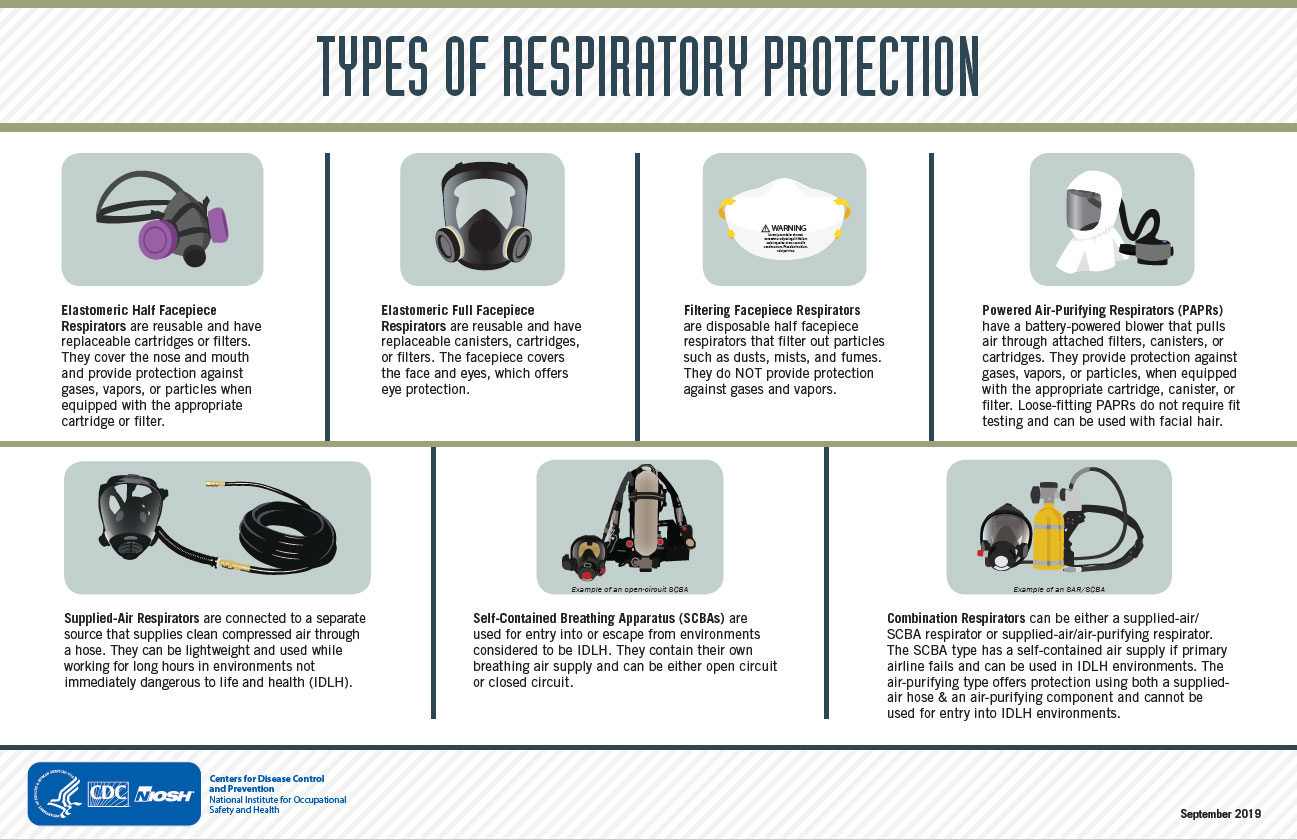
- Dust masks (Not recommended but better than nothing)
- Surgical masks (Not recommended but better than nothing)
- Particulate respirators N/R/P95, N/R/P99 or N/R/P100 (Highly recommended, get these if you can. Look for NIOSH approved )

Because Covid-19 can be transmitted through the eyes as well, eye protection is a necessity.
- Swimming goggles: You can find these for a buck or so at a dollar tree or dollar store, or at a sport shop
- Chemical splash goggles: The eye protection used in labs, this is ideal.
- Disposable face shield: This is only viable if you're wearing an N95 under it or something. You can make these yourself honestly, just cut a soda bottle and make a strap with some tape or something.
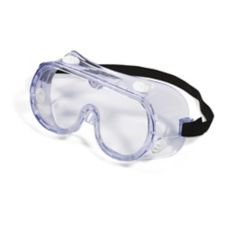
Shopping links(Avoid Chinese products for obvious reasons, 3M is a good brand):
Ebay links for n95 and p95
https://ebay.to/3alkziQ
https://ebay.to/2IjoOzv
Goggles
https://www.amazon.com/TR-Industrial-Anti-Fog-Approved-Wide-Vision/dp/B00O3K5RSS?ref_=fsclp_pl_dp_1
Difference between surgical masks and respirators
https://www.cdc.gov/niosh/npptl/topics/respirators/disp_part/respsource3healthcare.html
"Surgical masks are not designed for use as particulate respirators and do not provide as much respiratory protection as an N95 respirator. Surgical masks provide barrier protection against droplets including large respiratory particles. Most surgical masks do not effectively filter small particles from the air and do not prevent leakage around the edge of the mask when the user inhales."
Types of particulate respirators and the difference between N95, P95, N99 etc...
https://www.cdc.gov/niosh/npptl/topics/respirators/disp_part/default.html
Reusable face-masks/respirators(All recommended but unnecessary):
- Half face-mask Reusable Respirator: Not only are these reusable but the tightening straps guarantees that you'll be breathing out of the particulate filter. It leaves your eyes exposed though.
- Full face-mask respirator Same as the above, except that it offers full protection on your face. If shit hits the fan with a very high death rate, too many infections, and you have to drive to a crowded store to buy necessities for your family like food you'd be better off with this than any other mask.
- For gas masks CBRN/NBC rated is ideal but not necessary. Most of the best gas mask respirators are those usually rated as CBRN (Chemical, Biological, Radiological and Nuclear) or NBC (Nuclear, Biological and Chemical) protective gear. On top that, the NIOSH (National Institute for Occupational Safety and Health) seal is another factor that gives credibility to how effective the piece could be. Anything else should work but just make sure you have a solid face seal and that air isn't leaking in any way. Facial needs to be trimmed or shaved maybe using some cream to help it stick.
Canisters/Filters for face masks
If you're getting face masks/gas masks you need the filters otherwise it's useless in regards to breathing protection. Whatever masks you may get make sure you look into what kind of filters it uses as some have use their own exclusive type of filters like 3M and the M50, while some use the standard 40mm NATO cartridges which is ideal. You can get 3M converters that let you use 3M with 40mm and it comes with the 3M 7800S.
Types of filters you should get: CBRN/NBC approved, make sure it says P100 or P3
Maintenance: Canisters/Filters do expire but keep in mind that inside them are a layer of charcoal and then there is the particulate filtering layer, they don't "go bad" but the sealing glue around them can wear out and that's what the issue is so if it's only a couple years expired it won't really matter but be cautious of anything over 10 years. Another thing that makes a canister truly unusable is when it becomes too hard to breathe in, this is because of the activated charcoal and filter accumulating too many particles to become usable. Only buy canisters that are sealed and keep them sealed until you need to use them. Once exposed to air they only last for a 1 month.
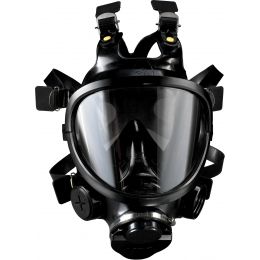

The 1st one uses 40mm cartridges while this one uses 3M.
Shopping links
At this point, most gas masks, usually military-grade, have become way over-priced to become financially viable especially because of the additional costs of respirators and such but keep on the lookout. In terms of budget, the 3M 7800S/B is worth it for a good gas mask with cheap and effective filters(Which are usually 3M), but there are many cheaper face masks that use 3M as well.
This is the cheapest full-face mask that can take 3M P100 filters
https://www.amazon.com/gp/product/B07RTMBS7D/ref=ppx_yo_dt_b_asin_title_o03_s01?ie=UTF8&psc=1
3M p100 filters
https://amzn.to/3auqmTz
P3 40mm canister
https://bit.ly/32NvU8P
More gas mask information
https://www.wikihow.com/Wear-a-Gas-Mask
https://www.cdc.gov/niosh/npptl/topics/respirators/factsheets/respfact.html
https://www.guidesmag.com/gas-mask/
https://thepreppingguide.com/gas-masks-military-grade-cbrn/
https://www.skilledsurvival.com/gas-mask-buyers-guide/
Body suits
The incubation period of the virus is estimated to be 1-14 days but most common is said to be 5 days. Therefore the virus could stay on on clothes and surfaces so protection would be necessary.
If you are getting these, remember to get gaffer tape or a residue-free tape to help seal boots, gloves and other things to the suit.
- DIY homemade suit: This can be made from garbage bags or other types of durable plastic, use heavy-duty scotch tape or duct tape to seal it together.
- Tyvek body suit: I would be wearing a Tyvek suit to shop for necessities. You would be more protected in a Tyvek suit, hood booties, and gloves. Tyvek suits breath to help you cool off. I have these and they are waterproof as well as windproof but they can tear easily.
- Tychem body suit: Tychem suits are more protective but much more sweaty and HOT as they don’t breathe like Tyvek. One hour in one and you’ll be hating life if it’s hot out. Tychem’s are Class 3 against viral aerosols–stopping all but .001% of viruses trying to make it through. They can be soaked in blood for more than 75 minutes before contaminants begin to pass but they are far from failsafe.

Shopping links
Right now Tyvek is the cheapest option
https://www.amazon.com/DuPont-TY122...tic-Coverall/dp/B01JOWAOEG?ref_=fsclp_pl_dp_2
Tychem
https://www.amazon.ca/s?k=dupont+tychem&gclid=CjwKCAiAnfjyBRBxEiwA-EECLO_MhOHDayVuMcL3atxGrFyVWg3nVYox684SLQvFpld_AvC3rkgoZRoCXfMQAvD_BwE&hvadid=229982984288&hvdev=c&hvlocphy=9000813&hvnetw=g&hvqmt=b&hvrand=3286506776326204305&hvtargid=aud-856944949865%3Akwd-300064980851&hydadcr=24223_10304066&tag=googcana-20&ref=pd_sl_7os7pbu68u_b
Hands
Obviously you will be touching various things throughout the day, this is the most common way to get viruses but prevention is better than cure so sanitize and wash your hands before you eat or touch your face in anyway. Having gloves will act as insurance as long as you never touch your face or food with it, dispose each time you go to public places.
Types of gloves
- Latex: is a cheaper option for those that do not require stronger chemical and puncture resistance but works just the same as any other glove.
- Vinyl: Is a non-latex glove for those with allergy issues, it's cheap but not as durable as Nitrile.
- Nitrile: Nitrile is a stronger higher quality glove then Latex & Vinyl and used by surgeons, highly recommended if you have to be outside and for long periods to interact with objects.
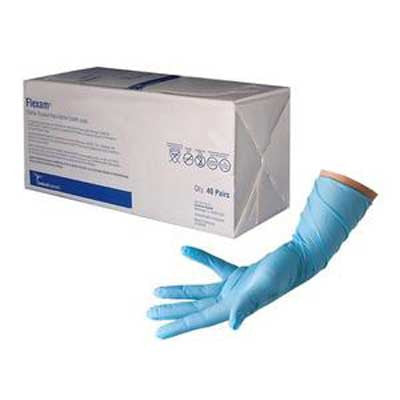
Nitrile vs Latex
https://www.theglovecompany.com.au/news-and-events/2018/which-gloves-are-better-nitrile-or-latex/
Shopping links
You can easily find Latex/Vinyl gloves at a pharmacy or grocery store.
Nitrile gloves
https://www.amazon.ca/AMMEX-BX3D46100-BX-Nitrile-Gloves-Disposable/dp/B00MGSH4VW?ref_=Oct_BSellerC_6370530011_2&pf_rd_p=7ed2b3c5-a5e9-56e2-86b0-9963303ba2e1&pf_rd_s=merchandised-search-6&pf_rd_t=101&pf_rd_i=6370530011&pf_rd_m=A3DWYIK6Y9EEQB&pf_rd_r=JFRY6FEVBXY27G2H2RNT&pf_rd_r=JFRY6FEVBXY27G2H2RNT&pf_rd_p=7ed2b3c5-a5e9-56e2-86b0-9963303ba2e1
Foot
- Rubber boots(rain boots): Should serve as the base protection of feet.
- DIY foot covers: You can make foot covers out of durable garbage or kitchen bags, use tape to make it and then make a layer of padding underneath with some duct tape. Remember to use gaffer tape to seal it to the body suit.
- Tychem foot covers, if you manage to find some for decent price then definetely buy them but as mentioned above you can make these yourself and considering that these are meant to be disposable it is the cheaper option.
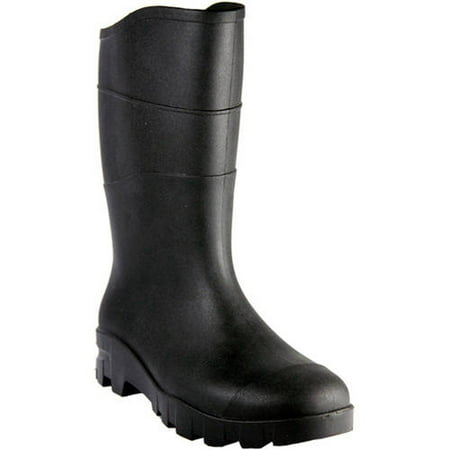
Sanitation
It’s true that alcohol gels don’t kill some viruses – such as norovirus and rhinovirus – but the coronavirus has an envelope structure which alcohol can attack. Hand sanitisers with more than 60 per cent alcohol content are most effective at killing microbes.
- Hand sanitizers: Disinfecting hands, hand sanitizers with less than 60 percent ethyl or isopropyl alcohol aren’t effective at killing germs so watch out for that. Ethyl alcohol, ethanol, isopropanol or some other variation is fine but make sure it has over 65 percent of it. Ideally each use should stay 15 seconds without evaporating, any shorter and you're not using enough. Use a brand has the hospital trusted logo on it.
- Bottles of rubbing alchohol: Get a few of these while you still can, go for 70% and why 70% you may ask?
https://labproinc.com/blog/chemicals-and-solvents-9/post/the-difference-between-isopropyl-alcohol-ipa-99-and-70-25
https://blog.gotopac.com/2017/05/15/why-is-70-isopropyl-alcohol-ipa-a-better-disinfectant-than-99-isopropanol-and-what-is-ipa-used-for/
So you want something in the range of 70-75%, anything higher is fine but you need to dilute it with distilled water.
For diluting, the formula is simple
Let's say if you want 100ml of 70% alchohol from a 99% 100ml bottle then:
100 ml bottle contains 99% alchohol
X ml bottle contains 70% alchohol
= (70ml x 100ml) /99ml = 70.7ml
So take 70.7ml of 99% alchohol and add 29.3ml of distilled water to get 100ml of 70% alchohol. 100ml is an example, change it to the amount that you have.
There is also bleach
https://www.ncbi.nlm.nih.gov/books/NBK214356/
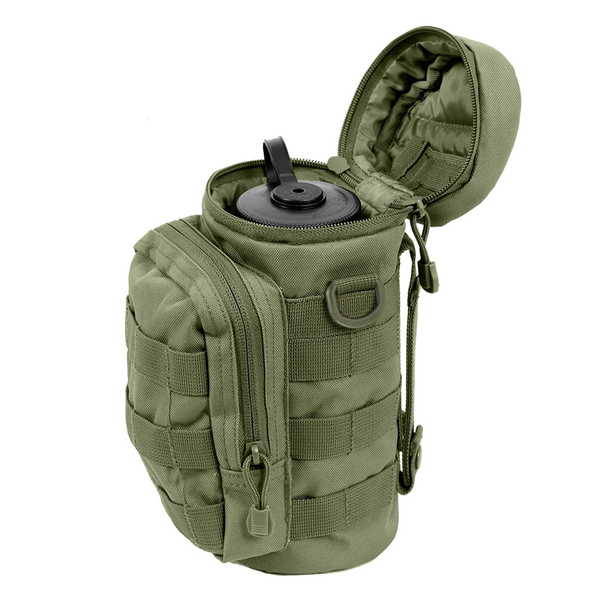
Take care everyone.
Face
Masks:

- Dust masks (Not recommended but better than nothing)
- Surgical masks (Not recommended but better than nothing)
- Particulate respirators N/R/P95, N/R/P99 or N/R/P100 (Highly recommended, get these if you can. Look for NIOSH approved )

Because Covid-19 can be transmitted through the eyes as well, eye protection is a necessity.
- Swimming goggles: You can find these for a buck or so at a dollar tree or dollar store, or at a sport shop
- Chemical splash goggles: The eye protection used in labs, this is ideal.
- Disposable face shield: This is only viable if you're wearing an N95 under it or something. You can make these yourself honestly, just cut a soda bottle and make a strap with some tape or something.

Shopping links(Avoid Chinese products for obvious reasons, 3M is a good brand):
Ebay links for n95 and p95
https://ebay.to/3alkziQ
https://ebay.to/2IjoOzv
Goggles
https://www.amazon.com/TR-Industrial-Anti-Fog-Approved-Wide-Vision/dp/B00O3K5RSS?ref_=fsclp_pl_dp_1
Difference between surgical masks and respirators
https://www.cdc.gov/niosh/npptl/topics/respirators/disp_part/respsource3healthcare.html
"Surgical masks are not designed for use as particulate respirators and do not provide as much respiratory protection as an N95 respirator. Surgical masks provide barrier protection against droplets including large respiratory particles. Most surgical masks do not effectively filter small particles from the air and do not prevent leakage around the edge of the mask when the user inhales."
Types of particulate respirators and the difference between N95, P95, N99 etc...
https://www.cdc.gov/niosh/npptl/topics/respirators/disp_part/default.html
N95 – Filters at least 95% of airborne particles. Not resistant to oil.
Surgical N95 – A NIOSH-approved N95 respirator that has also been cleared by the Food and Drug Administration (FDA) as a surgical mask.
N99 – Filters at least 99% of airborne particles. Not resistant to oil.
N100 – Filters at least 99.97% of airborne particles. Not resistant to oil.
R95 – Filters at least 95% of airborne particles. Somewhat resistant to oil.
P95 – Filters at least 95% of airborne particles. Strongly resistant to oil.
P99 – Filters at least 99% of airborne particles. Strongly resistant to oil.
P100 – Filters at least 99.97% of airborne particles. Strongly resistant to oil.
Reusable face-masks/respirators(All recommended but unnecessary):
- Half face-mask Reusable Respirator: Not only are these reusable but the tightening straps guarantees that you'll be breathing out of the particulate filter. It leaves your eyes exposed though.
- Full face-mask respirator Same as the above, except that it offers full protection on your face. If shit hits the fan with a very high death rate, too many infections, and you have to drive to a crowded store to buy necessities for your family like food you'd be better off with this than any other mask.
- For gas masks CBRN/NBC rated is ideal but not necessary. Most of the best gas mask respirators are those usually rated as CBRN (Chemical, Biological, Radiological and Nuclear) or NBC (Nuclear, Biological and Chemical) protective gear. On top that, the NIOSH (National Institute for Occupational Safety and Health) seal is another factor that gives credibility to how effective the piece could be. Anything else should work but just make sure you have a solid face seal and that air isn't leaking in any way. Facial needs to be trimmed or shaved maybe using some cream to help it stick.
Canisters/Filters for face masks
If you're getting face masks/gas masks you need the filters otherwise it's useless in regards to breathing protection. Whatever masks you may get make sure you look into what kind of filters it uses as some have use their own exclusive type of filters like 3M and the M50, while some use the standard 40mm NATO cartridges which is ideal. You can get 3M converters that let you use 3M with 40mm and it comes with the 3M 7800S.
Types of filters you should get: CBRN/NBC approved, make sure it says P100 or P3
Maintenance: Canisters/Filters do expire but keep in mind that inside them are a layer of charcoal and then there is the particulate filtering layer, they don't "go bad" but the sealing glue around them can wear out and that's what the issue is so if it's only a couple years expired it won't really matter but be cautious of anything over 10 years. Another thing that makes a canister truly unusable is when it becomes too hard to breathe in, this is because of the activated charcoal and filter accumulating too many particles to become usable. Only buy canisters that are sealed and keep them sealed until you need to use them. Once exposed to air they only last for a 1 month.


The 1st one uses 40mm cartridges while this one uses 3M.
Shopping links
At this point, most gas masks, usually military-grade, have become way over-priced to become financially viable especially because of the additional costs of respirators and such but keep on the lookout. In terms of budget, the 3M 7800S/B is worth it for a good gas mask with cheap and effective filters(Which are usually 3M), but there are many cheaper face masks that use 3M as well.
This is the cheapest full-face mask that can take 3M P100 filters
https://www.amazon.com/gp/product/B07RTMBS7D/ref=ppx_yo_dt_b_asin_title_o03_s01?ie=UTF8&psc=1
3M p100 filters
https://amzn.to/3auqmTz
P3 40mm canister
https://bit.ly/32NvU8P
More gas mask information
https://www.wikihow.com/Wear-a-Gas-Mask
https://www.cdc.gov/niosh/npptl/topics/respirators/factsheets/respfact.html
https://www.guidesmag.com/gas-mask/
https://thepreppingguide.com/gas-masks-military-grade-cbrn/
https://www.skilledsurvival.com/gas-mask-buyers-guide/
Body suits
The incubation period of the virus is estimated to be 1-14 days but most common is said to be 5 days. Therefore the virus could stay on on clothes and surfaces so protection would be necessary.
If you are getting these, remember to get gaffer tape or a residue-free tape to help seal boots, gloves and other things to the suit.
- DIY homemade suit: This can be made from garbage bags or other types of durable plastic, use heavy-duty scotch tape or duct tape to seal it together.
- Tyvek body suit: I would be wearing a Tyvek suit to shop for necessities. You would be more protected in a Tyvek suit, hood booties, and gloves. Tyvek suits breath to help you cool off. I have these and they are waterproof as well as windproof but they can tear easily.
- Tychem body suit: Tychem suits are more protective but much more sweaty and HOT as they don’t breathe like Tyvek. One hour in one and you’ll be hating life if it’s hot out. Tychem’s are Class 3 against viral aerosols–stopping all but .001% of viruses trying to make it through. They can be soaked in blood for more than 75 minutes before contaminants begin to pass but they are far from failsafe.

Shopping links
Right now Tyvek is the cheapest option
https://www.amazon.com/DuPont-TY122...tic-Coverall/dp/B01JOWAOEG?ref_=fsclp_pl_dp_2
Tychem
https://www.amazon.ca/s?k=dupont+tychem&gclid=CjwKCAiAnfjyBRBxEiwA-EECLO_MhOHDayVuMcL3atxGrFyVWg3nVYox684SLQvFpld_AvC3rkgoZRoCXfMQAvD_BwE&hvadid=229982984288&hvdev=c&hvlocphy=9000813&hvnetw=g&hvqmt=b&hvrand=3286506776326204305&hvtargid=aud-856944949865%3Akwd-300064980851&hydadcr=24223_10304066&tag=googcana-20&ref=pd_sl_7os7pbu68u_b
Hands
Obviously you will be touching various things throughout the day, this is the most common way to get viruses but prevention is better than cure so sanitize and wash your hands before you eat or touch your face in anyway. Having gloves will act as insurance as long as you never touch your face or food with it, dispose each time you go to public places.
Types of gloves
- Latex: is a cheaper option for those that do not require stronger chemical and puncture resistance but works just the same as any other glove.
- Vinyl: Is a non-latex glove for those with allergy issues, it's cheap but not as durable as Nitrile.
- Nitrile: Nitrile is a stronger higher quality glove then Latex & Vinyl and used by surgeons, highly recommended if you have to be outside and for long periods to interact with objects.

Nitrile vs Latex
https://www.theglovecompany.com.au/news-and-events/2018/which-gloves-are-better-nitrile-or-latex/
Shopping links
You can easily find Latex/Vinyl gloves at a pharmacy or grocery store.
Nitrile gloves
https://www.amazon.ca/AMMEX-BX3D46100-BX-Nitrile-Gloves-Disposable/dp/B00MGSH4VW?ref_=Oct_BSellerC_6370530011_2&pf_rd_p=7ed2b3c5-a5e9-56e2-86b0-9963303ba2e1&pf_rd_s=merchandised-search-6&pf_rd_t=101&pf_rd_i=6370530011&pf_rd_m=A3DWYIK6Y9EEQB&pf_rd_r=JFRY6FEVBXY27G2H2RNT&pf_rd_r=JFRY6FEVBXY27G2H2RNT&pf_rd_p=7ed2b3c5-a5e9-56e2-86b0-9963303ba2e1
Foot
- Rubber boots(rain boots): Should serve as the base protection of feet.
- DIY foot covers: You can make foot covers out of durable garbage or kitchen bags, use tape to make it and then make a layer of padding underneath with some duct tape. Remember to use gaffer tape to seal it to the body suit.
- Tychem foot covers, if you manage to find some for decent price then definetely buy them but as mentioned above you can make these yourself and considering that these are meant to be disposable it is the cheaper option.

Sanitation
It’s true that alcohol gels don’t kill some viruses – such as norovirus and rhinovirus – but the coronavirus has an envelope structure which alcohol can attack. Hand sanitisers with more than 60 per cent alcohol content are most effective at killing microbes.
- Hand sanitizers: Disinfecting hands, hand sanitizers with less than 60 percent ethyl or isopropyl alcohol aren’t effective at killing germs so watch out for that. Ethyl alcohol, ethanol, isopropanol or some other variation is fine but make sure it has over 65 percent of it. Ideally each use should stay 15 seconds without evaporating, any shorter and you're not using enough. Use a brand has the hospital trusted logo on it.
- Bottles of rubbing alchohol: Get a few of these while you still can, go for 70% and why 70% you may ask?
https://labproinc.com/blog/chemicals-and-solvents-9/post/the-difference-between-isopropyl-alcohol-ipa-99-and-70-25
Between the concentrations of 60% and 90%, Isopropyl alcohol is a very effective agent against microbial bacteria, fungi, and viruses. Higher concentrations don’t generate a much more desirable effectiveness against bacteria, fungi and viruses. This is because, there has to be a significant enough presence of water with the Isopropyl alcohol in order to be effective. And this percentage of water needs to be at least more than 10% within the solution. And the mixture of 30% water with 70% Isopropyl alcohol works best.
The reason water is so important is because it acts as a catalyst and has a major role in denaturing the proteins of cell membranes of vegetative cells. 70% IPA solutions are very effective in breaching the cell wall fully. Also, the presence of water slows down evaporation and increases the surface contact time with the membrane. With 91% IPA, the evaporation is instant and protein coagulates, rendering the effect of the IPA greatly reduced.
This means that 91% IPA takes a greater time to act and doesn’t kill as much bacteria as 70% IPA. The latter is also cheaper.
https://blog.gotopac.com/2017/05/15/why-is-70-isopropyl-alcohol-ipa-a-better-disinfectant-than-99-isopropanol-and-what-is-ipa-used-for/
Why Is 70% the Most Effective Concentration of Isopropyl Alcohol for Disinfection?
Isopropyl alcohol, particularly in solutions between 60% and 90% alcohol with 10 – 40% purified water, is rapidly antimicrobial against bacteria, fungi, and viruses. Once alcohol concentrations drop below 50%, usefulness for disinfection drops sharply. Notably, higher concentrations of alcohol don’t generate more desirable bactericidal, virucidal, or fungicidal properties.
The presence of water is a crucial factor in destroying or inhibiting the growth of pathogenic microorganisms with isopropyl alcohol. Water acts as a catalyst and plays a key role in denaturing the proteins of vegetative cell membranes. 70% IPA solutions penetrate the cell wall more completely which permeates the entire cell, coagulates all proteins, and therefore the microorganism dies. Extra water content slows evaporation, therefore increasing surface contact time and enhancing effectiveness. Isopropyl alcohol concentrations over 91% coagulate proteins instantly. Consequently, a protective layer is created which protects other proteins from further coagulation.
Solutions > 91% IPA may kill some bacteria, but require longer contact times for disinfection, and enable spores to lie in a dormant state without being killed. A 50% isopropyl alcohol solution kills Staphylococcus Aureus in less than 10 seconds (pg. 238), yet a 90% solution with a contact time of over two hours is ineffective. Some disinfectants will kill spores with exposures times that exceed 3-12 hours, which are classified as chemical sterilants. So why do higher alcohol solutions yield fewer results for bactericidal and antimicrobial outcomes?
So you want something in the range of 70-75%, anything higher is fine but you need to dilute it with distilled water.
For diluting, the formula is simple
Let's say if you want 100ml of 70% alchohol from a 99% 100ml bottle then:
100 ml bottle contains 99% alchohol
X ml bottle contains 70% alchohol
= (70ml x 100ml) /99ml = 70.7ml
So take 70.7ml of 99% alchohol and add 29.3ml of distilled water to get 100ml of 70% alchohol. 100ml is an example, change it to the amount that you have.
There is also bleach
https://www.ncbi.nlm.nih.gov/books/NBK214356/
Have a couple in the house and take some wherever you go as well as your hand sanitizer. Keep either the bleach or alchohol contained in an empty spray bottle like lysol, windex or barbers hair spray bottles are quite good. Everytime you go back to your house just spray down your whole suit and wait a while before going back in and then run everything under hot water for a couple minutes or so. It also helps to have a molle bottle pouch so that you can put your spray bottle inside and hang it around your waiste. Get something like this.Alcohol is effective against influenza virus (252). Ethyl alcohol (70%) is a powerful broad-spectrum germicide and is considered generally superior to isopropyl alcohol. Alcohol is often used to disinfect small surfaces (e.g. rubber stoppers of multiple-dose medication vials, and thermometers) and occasionally external surfaces of equipment (e.g. stethoscopes and ventilators). Since alcohol is flammable, limit its use as a surface disinfectant to small surface-areas and use it in well-ventilated spaces only. Prolonged and repeated use of alcohol as a disinfectant can also cause discoloration, swelling, hardening and cracking of rubber and certain plastics.
Bleach is a strong and effective disinfectant – its active ingredient sodium hypochlorite is effective in killing bacteria, fungi and viruses, including influenza virus – but it is easily inactivated by organic material. Diluted household bleach disinfects within 10–60 minutes contact time (see Table G.1 below for concentrations and contact times), is widely available at a low cost, and is recommended for surface disinfection in health-care facilities. However, bleach irritates mucous membranes, the skin and the airways; decomposes under heat and light; and reacts easily with other chemicals. Therefore, bleach should be used with caution; ventilation should be adequate and consistent with relevant occupational health and safety guidance. Improper use of bleach, including deviation from recommended dilutions (either stronger or weaker), may reduce its effectiveness for disinfection and can injure health-care workers.

Take care everyone.

